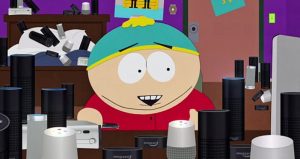Is Alexa Taking Over?
Angie Haas//Blog Writer
Alexa has become a household name — a personal assistant that comes in the form of a cylindrical speaker designed by Amazon. You can ask her just about anything and everything; you can even order products from Amazon with just a few words. Just say “Alexa” and the smart speaker will comply to any command that follows. But has the way that we do things changed since the emergence of smart speakers?

South Park recently released in episode in which the characters would randomly say “Alexa,” followed by orders such as “set an alarm for 7 a.m.” and real-life Alexa users went berserk after their smart speaker started performing these commands. She can hear everything you say and do, even without commands. In April of 2017, a prosecutor in a murder case requested to have access to recordings taken by the suspect’s smart speaker. While this goes against Amazon’s privacy rights, the suspect nevertheless obliged to hand over his smart speaker. I.e. it’s possible that Alexa has overheard pretty much everything you say and has some pretty messed up recordings in her database. Does this creep you out yet? The idea that Alexa has not only heard a murder, but also has recordings of it?
I think the people who are experiencing the most adverse affects of Alexa are in the publishing industry. When I hear the word publishing, I instantly picture a book or newspaper — both published on paper. Of course, both have now also moved to the internet and are electronically published. Alexa is just one more device out there to do damage to the print publishing industry.
First, print publishers had to worry about transitioning their works into ebooks, but now there is a whole new digital publishing platform for them to worry about. It’s no secret that voice technology is more complex than print and, though the most prevalent, Alexa isn’t the only smart speaker out there. Publishers now face the difficulty of working with multiple digital platforms as more technology is developed — and writers, who may already be struggling to make a living, make less money when digitally publishing their books than they do from print publishing.
Borders was put out of business years ago and Barnes and Noble may be next now that we can say “Alexa, read Pride and Prejudice to me.” This easy access to material is great for the consumer, but not so great for the producer — unless the producer is Amazon or Google. So what can we do to save the print publishing industry from being taken over by Amazon and Google? Well not much, but for now keep buying those books and newspapers in their print version.

What a content. Use full information.